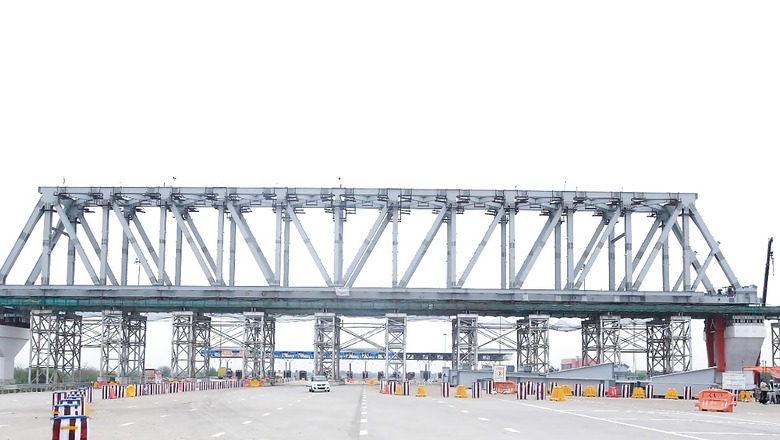
views
The National High Speed Rail Corporation Limited (NHSRCL) achieved a significant milestone by launching a 130-metre-long steel bridge over the Delhi-Mumbai National Expressway near Vadodara, Gujarat on Sunday, June 23. This bridge is a critical component of the Mumbai-Ahmedabad Bullet Train project, reflecting the country’s progress in high-speed rail infrastructure under the “Make in India” initiative.
The entire bridge launching process was completed within 24 hours, despite intermittent breaks to allow road traffic to pass. The bridge, weighing 3000 metric tons, stands 18 metre high and 14.9 metre wide. It was fabricated in Wardha, Maharashtra, and transported to the installation site via trailers. The bridge’s length is notable, potentially making it the longest steel bridge over a national highway in India.
The fabrication of this massive structure required approximately 124,246 Tor-Shear Type High Strength (TTHS) bolts. It features a C5 system painting and metallic spherical bearings, ensuring a 100-year lifespan. Assembling the bridge on site involved elevating it 15 metre from the ground using temporary trestles. An automatic mechanism, comprising two semi-automatic jacks with a capacity of 250 tons each, utilised Mac-alloy bars to pull the bridge into place.
This project exemplifies meticulous execution, maintaining the highest standards of safety and engineering excellence. It leverages Japanese expertise while utilising India’s technical and material resources. This steel bridge is a prime example of the “Make in India” initiative in action, showcasing the country’s growing capabilities in infrastructure development.
This installation marks the third of 28 steel bridges planned for the corridor. The first was launched across National Highway 53 in Surat, and the second over the Vadodara-Ahmedabad main line of Indian Railways near Nadiad, Gujarat. Steel bridges are particularly suitable for crossing highways, expressways, and railway lines, offering advantages over pre-stressed concrete bridges, which are typically used for spans of 40 to 45 metre, including river crossings.
India has extensive experience in fabricating steel bridges for heavy haul and semi high-speed trains operating between 100 and 160 km/h. This expertise is now being applied to the Bullet Train corridor, which will boast an operational speed of 320 km/h. The successful launch of this steel bridge underscores India’s capability to undertake complex infrastructure projects, paving the way for the country’s high-speed rail future.



















Comments
0 comment